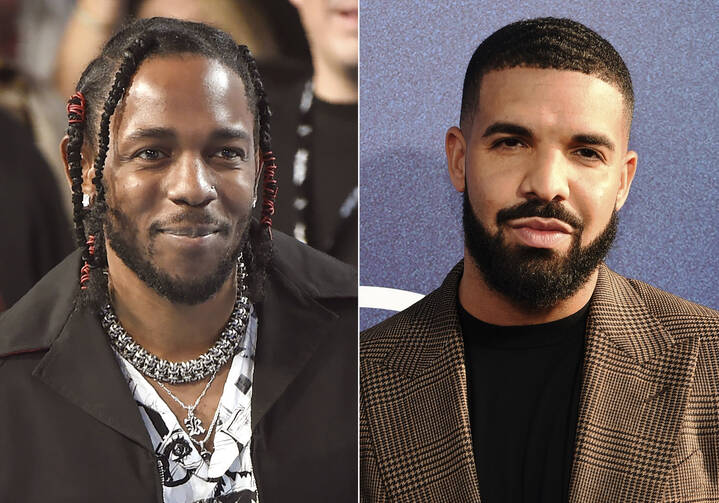Perhaps more than any other genre of popular music, feuds between artists have been an integral part of hip hop.
Rap beefs have served many purposes: One feud attempted to declare whether an M.C. from Brooklyn or Queens is the king of New York. Another drove 50 Cent to pull off one of the pettiest (albeit quite hilarious) concert sabotages ever. In still another, Remy Ma proved that men are not the only vicious wordsmiths within the genre.
Rap feuds also have their dark sides. Tragically, what started off as verbal sparring between Tupac Shakur and the Notorious B.I.G. escalated to real-life violence, taking the lives of two of the greatest rappers of all time when they were only in their 20s.
Still, beef has made for some of the most electrifying moments in hip-hop and sparked the creation of great music. “Hit ‘Em Up,” for instance, a classic diss track, is hailed as one of Tupac’s best songs. And right now, a beef between two of the biggest rappers in the world, Kendrick Lamar and Drake, has birthed unforgettable songs for both of these artists.
Lamar and Drake could not be more different, both musically and personally. Drake grew up in Canada and was a teen actor, appearing on “Degrassi.” Lamar was raised in Compton, Calif., a city historically known for poverty and violence as well as the home for some of the best hip hop ever recorded.
Drake is a master of the earworm, creating melodies and catchy hooks across his discography. As a result, he has found massive mainstream appeal. He consistently tops the charts with dance hits that place him more in the pop arena rather than being viewed as a traditional “rapper.”
Kendrick Lamar’s music places him more squarely in the lineage of hip-hop, a genre that embraces personal history and storytelling and puts a keen emphasis on introspection. It typically grapples with social problems such as racism, poverty and police brutality; these societal concerns are consistently present in Lamar’s lyrics.
Lamar has been hailed especially for his lyricism, which could be read as stand-alone poetry. Drake may dominate Top 100 charts, but he has not been met with the same kind of critical acclaim as Lamar. Lamar has 16 Grammys to Drake’s five. Lamar is also the first (and only) artist outside of the classical or jazz genre to win a Pulitzer Prize for Music.
Lamar and Drake’s relationship began positively, with the pair teaming up to record “Poetic Justice,” a hit track off of Lamar’s widely celebrated “Good Kid, m.A.A.d City,” released in 2012. But Lamar shook the rap industry when he was featured on Big Sean’s “Control” in 2013, calling out virtually every significant rapper at the time to produce better music—Drake included.
On the track, Lamar seethes to all names mentioned that he is “Tryna make sure your core fans never heard of you…/ They don’t wanna hear not one more noun or verb from you…” (ouch).
Nearly every big rapper had a response to that track, but not much was publicly exchanged between Drake and Lamar at the time. That went out the window in March, when Lamar was featured on Atlanta rapper Future’s “Like That.” Lamar dismissed the question about who the greatest rapper is amongst the “Big Three” (Lamar, Drake, and J. Cole). “It’s just big me,” he proclaims on the track.
This incendiary moment set social media ablaze and led to a flurry of diss tracks released by both Drake and Lamar, quickly devolving from a spirited competition of “who’s better than who” into launching unverified claims about each other’s supposed tumultuous family lives.
These accusations, which could be career-ruining if proven true, have captivated listeners’ attention perhaps beyond what even Lamar or Drake could have imagined.
As of this writing, four of the top 10 songs atop the global Apple Music charts were diss tracks released by Lamar and Drake. Lamar’s diss “Not Like Us” broke the single-day streaming record for a hip-hop song, a mark previously held by none other than Drake.
Opinions differ, but for me, Lamar’s digs are better written and more devastating; it’s worth noting Obama presciently predicted that Kendrick could beat Drake in a rap battle eight years ago.
Some of Lamar’s disses have accused Drake of being a musical “colonizer”; Lamar claims Drake only collaborated with deep South artists to earn “street credit” and boost his music sales.
Kendrick has positioned himself as a defender of legitimate hip-hop, arguing that he is saying what the rap world has been thinking for years but nobody (besides him) has had the courage to say explicitly. Lamar’s lines dissing Drake frequently include the word “we”: “And notice, I said ‘we,’ it’s not just me, I’m what the culture feelin’.”
Lamar’s engagement in such public lyrical warfare is particularly complex, maybe even a regression. It risks compromising the inner peace he has sought by staying out of the spotlight—Lamar is notorious for staying off social media and keeping a low profile in the public eye.
“And they like to wonder where I’ve been/ Protecting my soul in the valley of silence,” he once rapped about his enigmatic character.
In an interview with America, Alejandro Nava, a professor at the University of Arizona and an expert on the intersection of hip-hop and religion, commented on this feud. “I think what has always stood out to me about Kendrick Lamar’s music is just how prominent his struggle is to maintain the integrity of his soul,” Nava said.
“On his remarkable song ‘How Much A Dollar Cost,’ he’s asking, ‘What does it profit a man if he gains the whole world and loses his soul?’” said Nava. “So much of Kendrick Lamar’s work is commentary on that line, and his struggle to kind of maintain that religious integrity that he seeks.”
Lamar plainly calls out what he further sees as the absence of spirituality in Drake’s life when, on the track “euphoria,” he bites, “Speakin’ the truth and consider what God’s considerin’, you don’t/ know nothin’ ‘bout that.”
He also separates his own religious values and his feud with Drake. “Beat your a** and hide the Bible if God watchin’,” he raps on “Not Like Us.”
On “Meet the Grahams,” Lamar also claims that Drake has largely distanced himself from his Jewish background to become a more widely accepted artist. Lamar clearly presents his Christian faith regularly in his music.
But Lamar’s songs directed at Drake have also been problematic for including lines that are misogynistic and homophobic. Although Lamar laid down the track “Auntie Diaries” in 2022, an authentic, honest exploration of his feelings after his aunt underwent a sex change, it seems his forward thinking views on the LGBTQ community have reverted here.
“There has been precedent for these themes [of homophobia and misogyny] in the entire history of hip hop, whether or not one thinks there has been some evolution in that regard,” Nava said. “But it’s worth pointing out that in that ‘euphoria’ track itself, there are definitely traces of homophobia. And I didn’t think he needed to include those lines in the track.”
But this doesn’t mean that the songs need to be “canceled” or dismissed entirely; as Professor Nava puts it, Lamar and Drake are driving each other to be “as witty as possible,” which is a win for all fans of hip-hop. Beef may be nasty, but even when the dust settles between Drake and Lamar, these outrageously impassioned songs will be played long after this current flare up.








